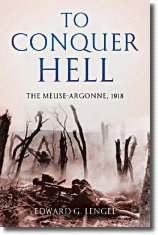 Edward G. Lengel is an associate professor of history at the University of Virginia. He is the author of several books on military history, including General George Washington: A Military Life. A recipient, with the Papers of George Washington documentary editing project, of the National Humanities Medal, he has made frequent appearances on television documentaries and was a finalist for the George Washington Book Prize.
Edward G. Lengel is an associate professor of history at the University of Virginia. He is the author of several books on military history, including General George Washington: A Military Life. A recipient, with the Papers of George Washington documentary editing project, of the National Humanities Medal, he has made frequent appearances on television documentaries and was a finalist for the George Washington Book Prize.He applied the "Page 99 Test" to his new book, To Conquer Hell: The Meuse-Argonne, 1918, and reported the following:
Page 99 of To Conquer Hell: The Meuse-Argonne, 1918, begins with a grisly episode from September 26th, the first day of the battle:Learn more about To Conquer Hell at the publisher's website.
“Another captured German soldier approached a group of Americans begging for water. ‘In reply,’ said a witness, ‘one of the men put a revolver to the German’s head and shot him through the temple.’”
War is capable of brutalizing the best of men. Americans, like soldiers from every other nation, sometimes committed atrocities in the heat of battle; and the fighting in the Meuse-Argonne was hotter than anything the Doughboys had ever seen. Page 99 continues:
“A lieutenant, a sergeant, and four privates from this regiment cleared a network of barbed wire defenses and moved over the crest of a knoll when the fog lifted. An automatic rifle opened fire on them from a clump of bushes ahead, and ‘as if by prearranged signal, enemy machine guns, automatics and snipers located in trees, gullies, and bushes ahead and on the flanks, opened with a hot fusillade which filled the air with snaps, cracks and whines of flying lead. Cut weeds, flying gravel and the harsh cracks of the bullets were proof enough that the patrol had located the resistance — and were in a bad trap.’ The sergeant fell, shot through the head; two privates were hit in the legs and another in the stomach. The lieutenant, carrying his revolver and two grenades, slithered through the mud and rolled into a shell hole, wondering how he had survived. ‘When the helmet rings with the cracks of ‘close ones’ and bits of flying gravel play a tattoo,’ he later explained, ‘one just naturally feels weak in the stomach and expects everything to suddenly turn black.’”
To Conquer Hell is about the Doughboys, and how they experienced and were transformed by what remains, with 26,000 dead, the bloodiest battle in American history. Utilizing hundreds of published and unpublished first-hand accounts, I describe how men from all over the United States overcame abysmal training, inadequate equipment, and sometimes incompetent generalship to crack one of the strongest German defensive systems in France and appreciably hasten the end of the First World War. The final chapter describes how the veterans returned home and attempted to readjust to civilian society. Some succeeded. Many didn’t.
In telling this story from the point of view of individual Doughboys, I am careful to avoid generalizing about their feelings and value judgments about the war. It would be all too easy to toss out narratives that don’t fit in with certain pre-conceived notions of what war is supposed to be like, although many historians of this and other wars have done so. Instead, I treat each soldier’s testimony with equal respect, finding that each man carried his experiences of the Meuse-Argonne in a unique way. My sole purpose in To Conquer Hell has been to tell the Doughboys’ stories, and to keep them alive in America’s historical memory.
--Marshal Zeringue



